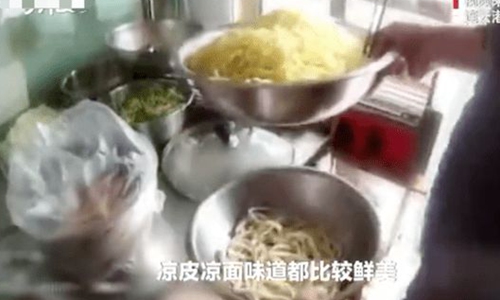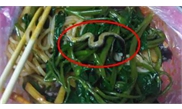Restaurant owner busted for adding poppies to dishes once again sparks food security concerns in China

Photo: Web
Concerns about food safety were sparked again after Chinese police busted a restaurant owner in East China's Jiangsu Province for adding poppy shells, which are used to make opium, to his noodles.
Police in Lianyungang, East China's Jiangsu Province, recently closed down a restaurant reported by a customer who had "suspected that the bowl of noodles he had may contain opium as he was addicted to their flavor and always wanted to go back for more," a local newspaper reported on Sunday.
Police found a large amount of chili oil that contained poppy shells and large quantities of poppy powder, the report said.
The restaurant owner has been detained while a further investigation into the source of the poppy shells is being carried out.
The police said that the owner came up with the idea to add poppy shells to his food to attract more customers after experiencing a downturn in his business.
Since poppies are the raw source of opium, it is illegal to trade or use them in food. Recently amended regulations say that individuals involved in the transportation, trading, storage or use of more than 500 poppy husks can face up to five years of imprisonment.
Despite the strict regulations in China, netizens still expressed worry that their food may be spiked as there have been many cases involving the illegal use of poppies recently, especially in restaurants.
A Zhengzhou-based lawyer reached by the Global Times warned that "the situations [mentioned above] are absolutely illegal. But many individuals, especially the elderly, who do not understand these regulations or some of restaurant owners who buy poppy shells in pursuit of profit for more customers are still out there."
In 2020, a 75-year-old woman who claimed she did not know poppies were illegal was caught growing the plants and storing 4,104 poppy seeds at home. She was sentenced to five years in prison.
In May, Chinese news outlet The Paper also conducted an investigation into the "dark medicine business." The outlet discovered that hundreds of kilograms of poppy powder were being sold every month across the country, mostly to street food stands or restaurants.
The report said that a kilogram of powder could sell for 800 to 1,800 yuan ($124-$280).
Sales were spread out from North China's Hebei Province and Central China's Henan to East China's Jiangsu Province, where 148 restaurants were involved and six suspects were under detention across the country.


